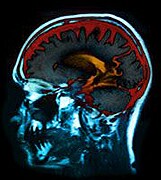

URL of this page: http://www.nlm.nih.gov/medlineplus/news/fullstory_69185.html (*this news item will not be available after 12/10/2008)

 WEDNESDAY, Sept. 10 (HealthDay News) -- A brain imaging study reveals why people who've recovered well from a brain injury often report mental fatigue and that they don't feel quite the same as they did before the injury, even though they score well on cognitive tests.
WEDNESDAY, Sept. 10 (HealthDay News) -- A brain imaging study reveals why people who've recovered well from a brain injury often report mental fatigue and that they don't feel quite the same as they did before the injury, even though they score well on cognitive tests.
The brains of people who've recovered from head injuries have to work harder than the brains of healthy people to perform at the same level, said researchers at the Rotman Research Institute at the Baycrest Centre for Geriatric Care, in Toronto.
For this study, functional MRI was used to assess brain activity in recovered brain injury patients and healthy people while they did a mentally challenging task that involved control and manipulation of information held in the mind. This type of high level cognitive performance is important in many daily tasks, such as organizing and problem-solving.
The eight patients in the study had suffered diffuse axonal injury (DAI), the most common effect of head injuries caused by fall, motor vehicle accidents and other events where the brain is rattled violently inside the skull, resulting in widespread disconnection of brain cells.
"Our imaging data revealed that DAI patient brains had to work harder to perform at the same level as healthy, non-injured brains. Specifically, the brain injury patients showed a greater recruitment of regions of the prefrontal cortex and posterior cortices compared to healthy controls," study leader Dr. Gary Turner said in a Baycrest news release.
The study appears in the Sept. 9 issue of Neurology.
"Our study adds to the emerging line of evidence that increased blood flow to areas not normally recruited during challenging mental tasks is related to reduced cognitive efficiency in patients with head injury," study co-author Dr. Brian Levine said in the news release.
The researchers said their findings will help in the future development of treatments to help brain injury patients improve their cognitive efficiency.
"Using neuroimaging methods to measure cognitive efficiency in the brain, as indicated by altered functional recruitment of brain regions during a memory task, may one day become a standard metric of rehabilitation outcome," Levine said.
Related MedlinePlus Pages:
Date last updated: 12 September 2008